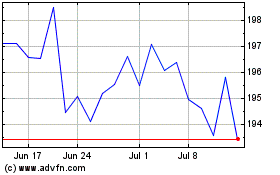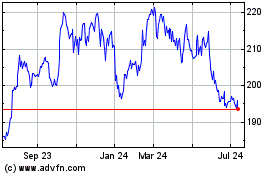Justice Department In Talks With CFTC On CME-ELX Rule Spat -Sources
August 27 2010 - 1:30PM
Dow Jones News
The Commodity Futures Trading Commission has spoken with the
Department of Justice concerning the futures regulator's antitrust
inquiry into CME Group's (CME) conduct in running its Treasury
futures market, according to people familiar with the matter.
The CFTC launched its own antitrust inquiry after rival start-up
exchange ELX Futures LP complained that CME was refusing to open
its Treasury futures market to new competition.
The spat centers on efforts by ELX to force CME to let customers
move futures contract positions between the two exchanges,
potentially steering some business away from CME, the largest
futures exchange in the world.
Although the CFTC said earlier this month it plans to study the
antitrust concerns raised by ELX, the Justice Department's interest
in the matter previously hasn't been reported.
People familiar with the matter said the CFTC is still the
primary agency in charge of the review. At this point, talks
between lawyers at the CFTC and Justice Department have been
informal, with the Justice Department providing some substantive
advice to futures regulators.
It is unclear whether the Justice Department has any plans to
launch its own separate probe or get formally involved in the
CFTC's antitrust analysis. However, the department's attention to
the issue underscores the importance of the CME-ELX debate, the
outcome of which could have important implications for market
competition.
It is not unusual for the Justice Department's antitrust
division to offer its expertise to other agencies that are
analyzing possible harms or impediments to competitive markets.
The Justice Department has approved two large acquisitions by
CME that have cemented its position as the dominant U.S.
derivatives exchange. However, its continued interest in CME has
unnerved investors in the past.
In a February 2008 memo, the department said a separation of
futures exchanges from their clearinghouses would help promote
competition among derivatives markets. The memo sent CME shares
plunging.
CME, which in July had 98.4% of the U.S. Treasury futures market
in the U.S., has long defended the current framework. The CME
argues its markets directly compete against internationally based
exchanges that share the same structure.
A spokeswoman for ELX declined to comment. A CME spokesman
didn't comment on this latest development, but he reiterated CME's
stance that it is not required to accept futures positions from the
rival exchange.
CME for years has had a stronghold over trading in Treasury
futures contracts. Last year, ELX became the latest exchange to try
to gain a slice of the Treasury futures business, following a
string of failed efforts that included Brokertec and Eurex U.S.
Last fall ELX won approval from the CFTC for a so-called
Exchange of Futures for Futures rule, or EFF. That rule would let
investors make privately negotiated trades designed to shift
Treasury futures positions between CME's clearinghouse and the
Options Clearing Corp, which clears for ELX.
But CME quickly blocked use of the rule in its market, saying it
was anticompetitive and would constitute illegal wash trades. Wash
trades are prohibited transactions that give the appearance of
trading activity, but carry no market risk and can lead to unfair
pricing.
ELX asked the CFTC to intervene. Earlier this year, the CFTC
released a letter challenging CME's legal justification for
blocking the EFF trades, saying the transactions don't constitute
wash trades. The agency has been discussing the matter with the two
exchanges ever since.
Earlier this month, the CFTC gave the CME 30 days to justify its
reasons for blocking EFF trades. The agency also said its staff is
conducting an antitrust review of the matter.
The CFTC's analysis is not a classic antitrust review because
the agency is not charged with policing violations of U.S.
antitrust law.
Instead, the CFTC has the responsibility to determine whether an
exchange's actions comport with core principles of the Commodity
Exchange Act, including one principle that requires an exchange to
avoid taking actions that could restrain trade or harm
competition.
ELX accused CME of violating that principle when CME warned its
members could face enforcement actions if anyone attempted to
conduct an exchange of futures for futures transaction.
CME, meanwhile, has tried to turn the tables on ELX, saying the
EFF rule is anti-competitive.
"Antitrust laws do not require us to take action to enable new
entrants to take advantage of our substantial investments in
innovation and marketing," CME said in January.
-By Sarah N. Lynch, Brent Kendall and Jacob Bunge, Dow Jones
Newswires; 202-862-6634; sarah.lynch@dowjones.com
CME (NASDAQ:CME)
Historical Stock Chart
From Jul 2024 to Aug 2024

CME (NASDAQ:CME)
Historical Stock Chart
From Aug 2023 to Aug 2024
